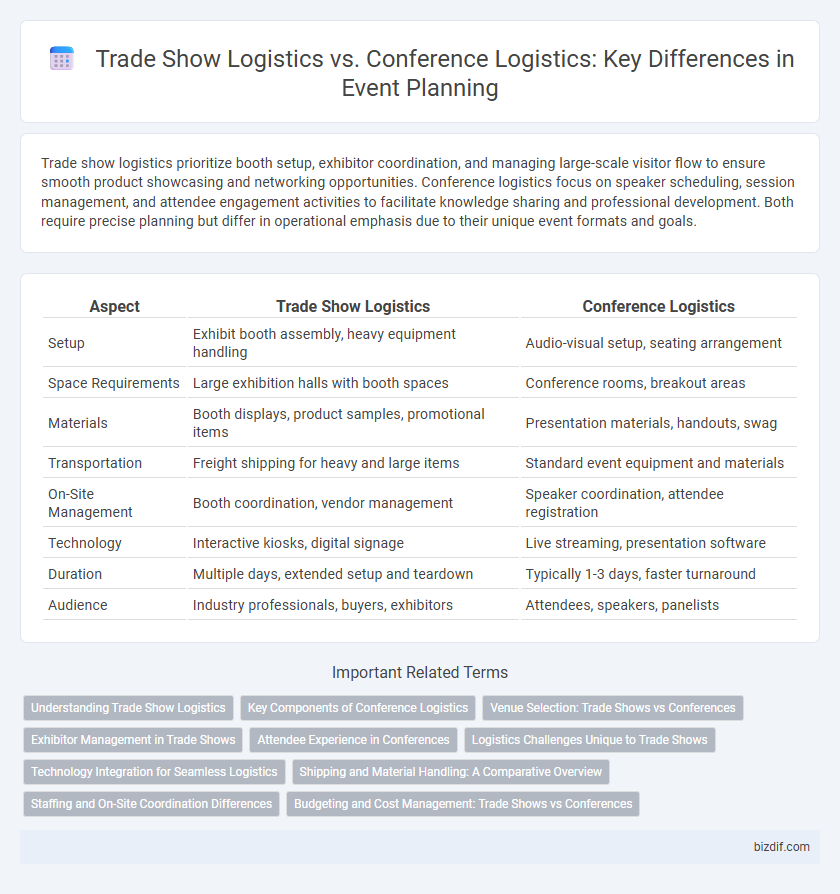Trade show logistics prioritize booth setup, exhibitor coordination, and managing large-scale visitor flow to ensure smooth product showcasing and networking opportunities. Conference logistics focus on speaker scheduling, session management, and attendee engagement activities to facilitate knowledge sharing and professional development. Both require precise planning but differ in operational emphasis due to their unique event formats and goals.
Table of Comparison
| Aspect | Trade Show Logistics | Conference Logistics |
|---|---|---|
| Setup | Exhibit booth assembly, heavy equipment handling | Audio-visual setup, seating arrangement |
| Space Requirements | Large exhibition halls with booth spaces | Conference rooms, breakout areas |
| Materials | Booth displays, product samples, promotional items | Presentation materials, handouts, swag |
| Transportation | Freight shipping for heavy and large items | Standard event equipment and materials |
| On-Site Management | Booth coordination, vendor management | Speaker coordination, attendee registration |
| Technology | Interactive kiosks, digital signage | Live streaming, presentation software |
| Duration | Multiple days, extended setup and teardown | Typically 1-3 days, faster turnaround |
| Audience | Industry professionals, buyers, exhibitors | Attendees, speakers, panelists |
Understanding Trade Show Logistics
Trade show logistics involves the coordinated management of booth setup, exhibitor materials, shipping schedules, and on-site storage to ensure seamless operations. Key components include managing freight movement, handling booth installation, and coordinating with vendors for timely delivery and setup. Understanding trade show logistics is crucial for optimizing exhibitor presence, minimizing downtime, and enhancing attendee engagement throughout the event.
Key Components of Conference Logistics
Conference logistics primarily involve managing venue selection, audio-visual equipment setup, and attendee registration systems to ensure seamless event flow. Coordinating speaker schedules, catering services, and accommodation arrangements are critical to maintaining participant satisfaction and engagement. Unlike trade show logistics, which focus heavily on exhibitor booth management and shipment coordination, conference logistics prioritize comprehensive planning around program delivery and attendee experience.
Venue Selection: Trade Shows vs Conferences
Trade show logistics prioritize expansive venues with large, open floor plans to accommodate exhibitor booths and high attendee traffic, ensuring easy navigation and accessibility for equipment. In contrast, conference logistics focus on venues offering multiple breakout rooms, advanced AV technology, and comfortable seating arrangements to facilitate presentations and networking sessions. Understanding these distinct spatial and functional needs is crucial for selecting the ideal venue to optimize event success.
Exhibitor Management in Trade Shows
Exhibitor management in trade shows involves coordinating booth assignments, shipping logistics, and on-site support to ensure seamless setup and operation, contrasting with conference logistics that prioritize session scheduling and attendee flow. Trade show logistics require detailed inventory tracking and real-time communication with exhibitors to handle equipment, promotional materials, and compliance with venue regulations. Efficient exhibitor management enhances lead generation opportunities and maximizes exhibitor ROI by facilitating targeted engagement and professional presentation.
Attendee Experience in Conferences
Trade show logistics prioritize booth placement, exhibitor needs, and crowd flow management, while conference logistics focus on session scheduling, speaker coordination, and networking opportunities to enhance attendee engagement. Optimizing conference logistics ensures seamless transitions between presentations, accessible information points, and comfortable seating arrangements, directly impacting attendee satisfaction. Efficient management of audiovisual equipment and breakout rooms further enriches the learning environment and overall experience at conferences.
Logistics Challenges Unique to Trade Shows
Trade show logistics present unique challenges such as managing large-scale booth installations, coordinating heavy equipment deliveries, and adhering to strict venue regulations for setup and teardown. Unlike conferences, trade shows require precise timing for exhibitor arrivals and comprehensive handling of shipping and storage for promotional materials. Ensuring efficient on-site coordination and managing exhibitor services are critical to overcoming the complexities of trade show logistics.
Technology Integration for Seamless Logistics
Trade show logistics leverage advanced RFID tracking and interactive digital kiosks to streamline exhibitor setup and attendee navigation, enhancing real-time data collection and inventory management. Conference logistics prioritize integrated event apps and AI-powered scheduling tools that enable seamless session management, personalized agendas, and instant networking opportunities. Both formats benefit from cloud-based platforms for centralized communication and analytics, ensuring efficient coordination and superior attendee experiences.
Shipping and Material Handling: A Comparative Overview
Trade show logistics require meticulous coordination of large shipments, including booth materials, exhibits, and promotional items, demanding specialized freight management and careful scheduling to ensure timely arrival and setup. Conference logistics emphasize handling lighter, more varied materials such as audiovisual equipment, handouts, and branded merchandise, often necessitating efficient packaging and on-site distribution strategies. Both event types benefit from advanced tracking systems and professional material handling to minimize damage and streamline operations throughout the event lifecycle.
Staffing and On-Site Coordination Differences
Trade show logistics require specialized staffing with expertise in booth management, product demonstrations, and crowd engagement, emphasizing rapid problem-solving and real-time coordination on the trade floor. Conference logistics focus on coordinating speakers, session timings, and attendee registration, necessitating staff skilled in schedule management and smooth transitions between presentations. On-site coordination for trade shows involves managing exhibit setups and vendor interactions, while conferences demand precise oversight of audio-visual equipment and venue layout adjustments.
Budgeting and Cost Management: Trade Shows vs Conferences
Trade show logistics require detailed budgeting for booth space, exhibit materials, and shipping costs, often leading to higher upfront expenses compared to conferences. Conference logistics focus more on venue rental, speaker fees, and attendee accommodations, making cost management revolve around registration fees and sponsorships. Effective budgeting in trade shows emphasizes tangible marketing investments, while conferences prioritize experiential and educational spending.
Trade show logistics vs Conference logistics Infographic

 bizdif.com
bizdif.com